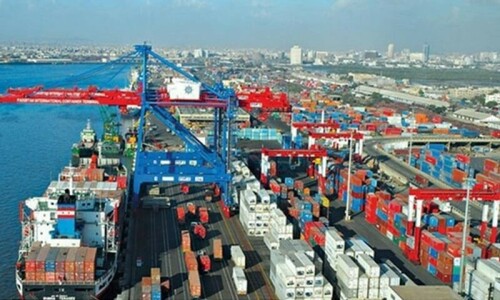With the collapse of pre-budget negotiations between farmers and the federal government, the situation looks tense.
The most active farmers’ body — the Pakistan Kissan Ittehad (PKI) — had presented a number of demands through advertisements in national papers and was invited to the federal capital for talks with the federal government.
The farmers wanted removal of the general sales tax (GST) and the Gas infrastructure Development Cess (GIDC) on fertiliser prices in the budget, withdrawal of all taxes on inputs and farm machinery, a stop to agriculture trade with India and declaration of agriculture as an industry. “All of them have been rejected by the federal government,” tells Khalid Khokhar, chief of the PKI.
Farmers and policy analysts think that the federal government should prioritise four issues — bio-tech, farm mechanisation, storage and marketing — and come up with a clear policy and incentive package for them.
Farmers and policy analysts think that the federal government should prioritise four issues — bio-tech, farm mechanisation, storage and marketing — and come up with a clear policy for them
This is also necessary because federal policies over the last two years have helped start a revival process, which now needs to be taken to the next level.
During 2016, almost the entire range of crops benefited from the low price of fertiliser and relatively better marketing strategies. It is time to concentrate on major problems that can put the sector on the road to long-term recovery.
The policy direction on bio-tech has been missing for too long; for the last twelve years the National Bio-safety Committee, which has to spearhead the national initiative, has been in hibernation.
Pakistan has 51 bio-tech institutes, 27 of them high-tech institutes with an investment of billions of rupees. All of this is rusting as there is no policy direction, nor an answer to the question of whether bio-tech is a boon or bane for Pakistan.
No research institute has been able to deliver a single uniform variety of seeds that could withstand the emerging climatic variations. Wheat is one such example, where per acre yield is stuck at around 30 maunds.
“The government needs to have a policy direction on bio-tech if it wants to revive the sector and ensure food security,” says Iqrar Ahmad Khan, vice-chancellor of the Agriculture University, Faisalabad. It should come up with the necessary incentives to revive research, he says.
Similarly, farm mechanisation which is essential to improve farming is in a shambles. The last few governments have only helped tractorisation by directing all subsidies to it instead of promoting mechanisation.
The soil needs three kinds of implements: primary (for soil preparation), secondary (agronomic practices) and tertiary (harvesting).
Though tractors have a role to play in all three categories, their utility, however, is compromised in the absence of other implements.
Here again, the major issue has been a lack of policy direction and incentive, low bank lending and the poor state of local machinery manufacturing. All these areas need intervention and taxation and duty incentives, which fall in the federal jurisdiction. The budget is the time to provide it all.
Another vital area is the lack of adequate storage (including the cold chain) facilities in the country, which results in a 40 to 50pc loss of produce post-harvest.
There have been numerous attempts in the last few years to develop a storage infrastructure in the country but none of them succeeded because of the policy vacuum. More than 60pc of Punjab’s wheat is being destroyed in the open owing to lack of storage.
With the China-Pakistan Economic Corridor (CPEC) taking shape, it may be easier for Pakistan to construct a cold storage corridor along major trading routes.
Finally, marketing represents the fourth challenge, especially because of previous attempts of the federal government — like denting the price of fertiliser through subsidies and investing on farm to market roads.
The government now needs to invest, or incentivise investment, in marketing and push the provincial government to improve the governance of these markets.
Focus on these four issues is not meant to underestimate the importance of other areas, but only to argue that prioritisation brings them to the top, making them starting points. After devolving the sector to provinces, the federal government’s responsibility has only increased to clarify policy regimes and push provinces to follow then in letter and in spirit.
Published in Dawn, The Business and Finance Weekly, May 29th, 2017














































